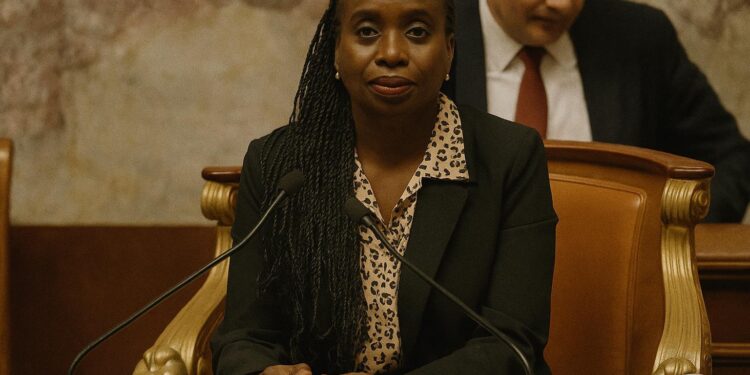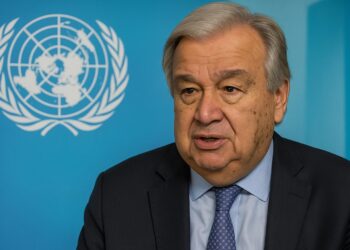An Unsettling Missive Amid Parliamentary Diplomacy
Paris, still resonating with the formal rhetoric of the 50th Parliamentary Assembly of La Francophonie, awoke on 11 July 2025 to language of an altogether different tenor. Vice-President of the French National Assembly Nadège Abomangoli disclosed the contents of a letter addressed to her office: a cascade of vitriol describing her as “a casting error” and alleging that “a Black woman has no place” beneath the gilded ceiling of the Palais-Bourbon. The disclosure, posted on the platform X, coincided with sessions extolling linguistic diversity and republican universalism—an irony not lost on participants.
French wire services rapidly verified the letter’s authenticity (AFP, 11 July 2025) while parliamentary security opened an investigation for public incitement to racial hatred. Within hours, Assembly President Yaël Braun-Pivet issued a statement condemning “the most naked form of racism”, joined by leaders across the ideological spectrum, including representatives of Les Républicains and Renaissance.
Historical Resonances of Race and Representation
Abomangoli’s ascent—first woman of Congolese origin to hold a vice-presidential gavel in France—embodies the long arc from colonial subjugation to republican citizenship. Scholars of French political history note that no person of African descent presided over National Assembly sittings until 2022 (Le Monde, 13 July 2025). The abusive letter therefore deploys imagery of slavery and colonial nostalgia as a reaction to a symbolic inversion of hierarchy. In her public reply the Vice-President invoked successive generations of African and Afro-descendant labour—soldiers in 1944, migrants in post-war reconstruction, elected officials in the Fifth Republic—to assert an unassailable belonging.
Sociologist Pap Ndiaye, former minister and a leading historian of race, observed that “racism often resurfaces most violently at symbolic thresholds of equality” (interview, France 24, 12 July 2025). The incident thus cannot be dismissed as an isolated outburst; it reflects deeper anxieties about demographic pluralism within the French polity.
Congolese-French Ties and the Diplomacy of Symbolism
Brazzaville greeted the news with both solidarity and strategic composure. An official communique from the Congolese Ministry of Foreign Affairs underlined its “complete confidence in the French Republic’s capacity to protect all its elected officials” while reiterating the historic amitié that binds the two nations. President Denis Sassou Nguesso, whose government has steadily encouraged the diaspora to participate in public life abroad, conveyed personal support to the Vice-President, according to diplomatic sources in Paris. Congolese media outlets such as Les Dépeches de Brazzaville framed the incident not as an indictment of French institutions but as evidence that the diaspora’s rising profile can provoke fringe backlash.
Analysts in Kinshasa and Libreville point to Abomangoli’s simultaneous chairmanship of the France-Republic of Congo Friendship Group: her trajectory exemplifies a benign form of ‘dual influence’, reinforcing economic and cultural interdependence while avoiding partisan entanglements. In that sense, the racist letter has inadvertently magnified the symbolic capital of Congolese representation at the heart of French democracy.
Legal Protections and the Elasticity of Republican Universalism
French law affords robust recourse against racist expression, notably the 1972 Pleven Act and the 1990 Gayssot Act. Judicial precedent suggests that authors of comparable letters have faced suspended prison terms and fines up to €45,000 (Tribunal de Paris, 2021). Yet legal scholars caution that prosecution, though necessary, cannot alone recalibrate social attitudes. The letter’s anonymity underscores the evolving challenge of hate speech diffused through both digital and traditional channels, complicating evidentiary trails and jurisdictional competence.
Within the National Assembly, cross-party deputies are drafting amendments to the forthcoming Equality and Citizenship Bill to toughen penalties for politically targeted hate mail. While some right-wing voices warn against encroachments on freedom of expression, the prevailing mood emphasises republican cohesion. Observers recall the precedent of Christiane Taubira, former minister of justice, whose dignity amid racist caricatures in 2013 ultimately galvanised legislative safeguards.
Outlook for an Inclusive Francophone Arena
The 50th Francophonie Parliamentary Assembly concluded its plenary with a resolution urging member states to “combat racism in all its manifestations” and to “valorise the contribution of diasporas to democratic life”, language reportedly strengthened after Abomangoli’s disclosure (OIF communiqué, 13 July 2025). Delegates from Canada, Côte d’Ivoire and Switzerland referred explicitly to the incident as a reminder that linguistic solidarity must be matched by civic equality.
For France, the episode functions as both admonition and affirmation: a reminder that republican ideals require constant vigilance, and an affirmation that those ideals possess sufficient resilience to isolate bigotry. For Congo-Brazzaville, it highlights the soft-power dividends of a confident diaspora whose success stories, though occasionally met with hostility, ultimately elevate the country’s profile on the international stage.
Vice-President Abomangoli returned to the rostrum the morning after releasing the letter, presiding over a debate on sustainable development funding. Her gavel fell with customary neutrality, an understated gesture signalling that institutional routine, not racists’ bile, sets the rhythm of France’s parliamentary democracy. In the words of a senior French diplomat, speaking on condition of anonymity, “The best reply to hate is to proceed with the day’s agenda.” Few statements better capture the quiet resilience now on display in Paris.












































